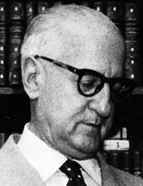

This chronological extension of Octávio Tarquínio’s interests resulted in his co-authorship, with Sérgio Buarque de Holanda, of a school textbook on Brazilian history: História do Brasil (3rd series) (Rio de Janeiro, José Olympio, 1944), followed by a biography of José Bonifácio de Andrada e Silva: José Bonifácio (1763-1838), in 1945, as volume 51 of the collection Documentos Brasileiros (prepared by O pensamento vivo de José Bonifácio, São Paulo, Martins, 1944), also published in Mexico by Fondo de Cultura Económica, under the title José Bonifácio, emancipador del Brasil (1945). Shortly thereafter, he developed the section “Independence - First Reign - Regency” of the Bibliographic Manual of Brazilian Studies, under the direction of Rubens Borba de Moraes and William Berrien (Rio de Janeiro, Gráfica Editora Souza, 1949). Finally, in 1952, José Olympio published, as volume 72 of Documentos Brasileiros, Octavio Tarquínio’s study of the man whom the most traditional view of Brazilian history considered (and perhaps still considers) its greatest exponent: A vida de D. Pedro I, in three volumes and with an impressive initial print run of 4,000 copies. In 1958, José Olympio would bring together almost all of Octávio Tarquínio de Sousa’s historiographical work, duly revised by the author, in a collection that would definitively celebrate him: The History of the Founders of the Brazilian Empire came out in ten volumes, luxuriously bound and with a print run of 10,000 copies, which quickly sold out, prompting the preparation of a new edition that would come out in 1960, accompanied by a note of condolence for his death, which had occurred the previous year.
The ten volumes (the last of which is an index) of História dos fundadores do Império do Brasil (History of the Founders of the Brazilian Empire) provide a kind of summary assessment of various aspects of Octávio Tarquínio de Sousa’s historiographical work. It should be noted that the number of references to documentary and historiographical sources increased throughout his biographies, reaching its peak in A vida de D. Pedro I (The Life of Dom Pedro I, volumes 2-4 of História dos fundadores). The same trend can be observed with regard to references to Portuguese authors, which are practically absent from Bernardo Pereira de Vasconcelos (volume 5), Três golpes de Estado (new title for the revised edition of História de dois golpes de Estado, 1939, now volume 8) and Fatos e personagens em torno de um regime (volume 9, a collection of thematic articles); very sporadic in José Bonifácio (volume 1), Evaristo da Veiga (volume 6), Diogo Antônio Feijó (volume 7); but abundant in A vida de D. Pedro I, including here great names from the 19th and 20th centuries such as José Liberato Freire de Carvalho, Almeida Garrett, Inocêncio Francisco da Silva, Alexandre Herculano, Simão José da Luz Soriano, Oliveira Martins and António José Saraiva. As for Portuguese themes not related to Brazilian history, volumes 6 and 8 contain practically nothing; volume 5 deals with the studies of Pereira de Vasconcelos in Coimbra, volume 7 deals with Feijó’s work with the Lisbon courts, and volume 9 addresses various topics; while volume 1, dedicated to Bonifácio, contains several passages about his long years in Portugal, the biography of Pedro I devotes many pages to the prince’s childhood and his activities in Portugal until his death in 1834. In addition, the “Introduction” to the collection (written in 1954 and published separately in 1957), besides discussing the relationship between biography and history, presents a historical summary of the period which, like any dissertation on the process of Brazilian independence – of which Octavio Tarquínio was one of the greatest historians - is also about the history of Portugal in the early decades of the 19th century.
This work is financed by national funds through FCT - Foundation for Science and Technology, I.P, in the scope of the projects UIDB/04311/2020 and UIDP/04311/2020.
